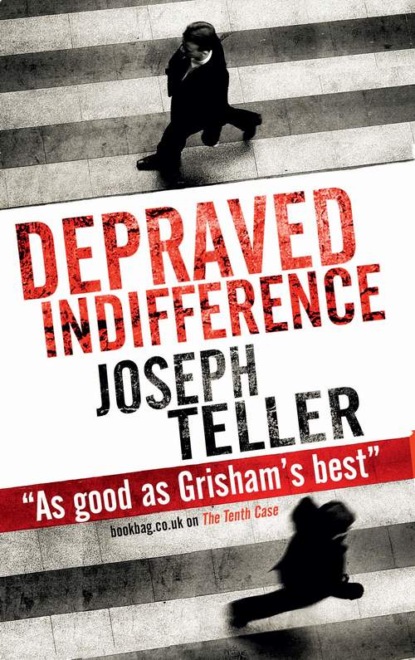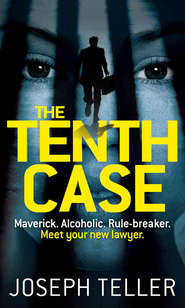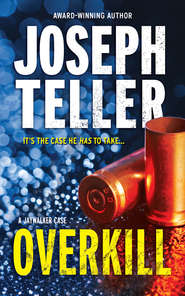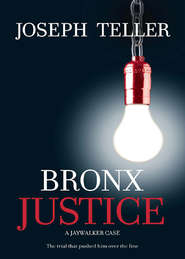По всем вопросам обращайтесь на: info@litportal.ru
(©) 2003-2024.
✖
Depraved Indifference
Автор
Год написания книги
2018
Настройки чтения
Размер шрифта
Высота строк
Поля
“So it’s okay if you’re sleeping with her.”
“Who said I’m sleeping with her?” asked Jaywalker, doing his best to summon up an appropriate measure of righteous indignation at the idea.
“Nobody,” said Drake. “All I said was, it’s okay if you are.”
Jaywalker shifted his weight in his chair. “What I was about to tell you,” he said, “was that your wife, estranged or not, would like me to take over for Mr. Mermelstein at some point.”
“So she told me.”
“So how about we discuss your case?” Jaywalker suggested.
“Here?”
Jaywalker looked around. “I suppose we could reserve a table at the Oyster Bar,” he said.
“That’s not what I meant,” said Drake. “Everyone says these phones are monitored.”
Jaywalker was about to explain that while that was no doubt true, the guards knew enough not to record or listen in on lawyer-client conversations, which were privileged. Then he realized: he wasn’t Drake’s lawyer, or a lawyer at all, for that matter. So this wasn’t a lawyer-client conversation. And even though he was arguably there on behalf of Mermelstein, who was a lawyer, he could hardly count on the corrections officials who ran the place to grasp such nuances. “You’re right,” he agreed.
“Can you get me out?” Drake asked. “I mean, five million dollars’ bail on a drunk-driving case? Not that I couldn’t have come up with it. But the lawyers for the families have gone into civil court and frozen all my assets.”
“It’s not really a drunk-driving case,” said Jaywalker. “Nine people died.”
“I know that,” said Drake. “But it was still an accident. I mean, I never meant to kill them. Everyone knows that.”
He had a point there. Jaywalker had long marveled at the courts’ schizophrenic attitude toward drinking and driving. If you got pulled over at a checkpoint with six or seven drinks in your system, you paid a fine and got your license suspended for ninety days. The second time, the fine got a little bigger, the suspension a little longer. You got what, maybe four or five bites of the apple before they got serious and actually revoked your license, and one or two more before they slapped you in the local jail for thirty days.
But God help you if you had those same six or seven drinks and got into the same car and drove at exactly the same speed, but were unlucky enough to broadside a school bus, or run a vanful of kids off a road and into a fireball. Then suddenly you were a murderer, front-page stuff, Public Enemy Number One. And you were looking at twenty-five years to life.
Where had this institutional hypocrisy come from? Jaywalker—who, if asked, had a theory for most things—had a pretty good idea.
Judges were lawyers, after all. They’d come from privileged-enough backgrounds to have been able to afford to go off first to college and then law school. They were financially able to have bankrolled their own campaigns, or to cough up enough political contributions to the campaigns of others who, once elected, had appointed them to the bench. In other words, they weren’t street people. They didn’t go around committing robberies, burglarizing apartments or selling drugs, and they had little natural empathy for those who did. But they drank, some of them, and they drove. And occasionally they even combined the two endeavors. That was something they could empathize with. So they were ready to look the other way or apply an understanding slap to the wrist of anyone who happened to get caught doing what they themselves had done more than once.
But kill someone? Kill nine someones? Including eight innocent little Jewish kids? That was a different story altogether. For one thing, they’d never done that, had they? And sitting there in the glare of publicity, with the families of the victims, the media and the rest of the world screaming for blood, those very same judges all of a sudden became the toughest lock-’em-up-and-throw-away-the-key law-and-order types that ever lived. Murder? You bet! Five million dollars’ bail? Not a penny less! We’ll show those vicious drunk-driver menaces that we mean business!
“No,” he told Drake, “I can’t get you out of here. But I’ll talk to Mr. Mermelstein, see if he can do anything about getting some of your assets untied. In the meantime, I’d like you to do something for me.”
“What’s that?”
“Get a hold of some paper and a pen, and write out, in as much detail as you possibly can, everything that happened over the twenty-four-hour period preceding the accident, the accident itself and everything afterward, up to the time you were brought to court. At the top of each page, write the words ‘Confidential, For My Lawyer Only.’ I’ll be back in a few days to pick it up. Can you do that for me?”
“I guess so.”
“Good,” said Jaywalker. “And remember, I want as much detail as you can possibly give me. Understand?”
“I understand.”
“I want a book.”
Drake nodded.
“Okay,” said Jaywalker. “I hate doing it this way, and I’m sorry to have to give you a homework assignment like this. But I’m afraid you’re probably right about these phones.”
It was the truth. Not just the part about the phones being less than secure, but the part about being sorry, as well. It was what lazy lawyers did, had their clients write out statements instead of drawing the facts out of them in a cooperative process. Left to their own, people tended to summarize, Jaywalker had learned over the years. They omitted the myriad of tiny details that, when included and uttered from the witness stand, fleshed out a narrative and gave it the hallmark of truth. Having a witness testify that “it wasn’t quite dark out,” for example, wasn’t going to convince anyone. But were the same witness to add, “At one point I had to check my directions, and it turned out there was still just enough daylight for me to read them,” the jurors would come away with a concrete image burned in their minds. Not only would they remember what the witness said about the lighting, they’d also believe him. Why? Because his narrative had been so detailed and so specific, and so consistent with the jurors’ own everyday experiences. Still, despite the admonition to include as much detail as possible, Jaywalker knew that Carter Drake would summarize the facts to a certain extent. Everyone did. But it would be a start, at least, something to work with for the time being.
That night, Jaywalker reported to Amanda what he’d done so far on the case. Which didn’t sound like much, once he heard himself run down the list out loud. But she seemed to think otherwise.
“I’m impressed,” she said, sipping a martini. Both of her nipples were covered this time, but only because they were in a restaurant. An hour earlier that had decidedly not been the case.
“Above all else,” the angel perched on Jaywalker’s left shoulder had whispered, “you must avoid conflicts of interest.”
“Schmuck!” had shouted the devil on his right shoulder, who was not only louder and far more persuasive, but apparently Jewish. “They’re separated!”
And so it had come to pass that once again Jaywalker had succumbed to human frailty, primal instinct and Amanda Drake. And had he been forced afterward to take the stand and defend himself under oath, the very best he could have come up with was that the devil had made him do it.
“Seriously,” Amanda was saying, “I’m surprised Carter would speak to you at all.”
Jaywalker managed to raise his eyebrows while sipping his Coke. His drinking days were behind him. He hoped.
“I mean, he wouldn’t talk to the police, he wouldn’t talk to Chet Ludlow, and he barely says a word to Judah Mer-melstein. Except to keep asking him when he can get the bail reduced. And now he’s going to write the whole thing out for you, and in detail. That’s progress, isn’t it?”
“Why the silent treatment?” Jaywalker asked.
Amanda shrugged. “Guilt, I guess. I mean, it was a pretty bad accident. I think he’s horrified by it and wants to be punished.”
Jaywalker was tempted to say, He’s going to get his wish. But he didn’t want to come across as too pessimistic. Not yet, anyway. There’d be plenty of time for that down the road, when Carter Drake would wake up one morning to the reality that they were aiming to give him twenty-five years to life in state prison. He wouldn’t feel he deserved that kind of punishment.
They ordered dinner, Amanda a steak, medium-rare, Jaywalker a burger and another Coke. When the check came, he reached for his wallet, but she’d already picked it up. Instead of arguing the point, he thanked her. He figured if he tried hard enough, he could get used to being kept. Especially while he was on an investigator’s salary.
Way back in his DEA days, Jaywalker had worked with a fellow agent named James Chippamunga, whom everyone referred to, naturally enough, as Jimmy Chipmunk. Law enforcement was similar to the military in that respect, or sports teams. Pretty much everyone got a nickname. It was at the DEA, in fact, that Harrison J. Walker had become Jaywalker.
Jimmy Chipmunk was what they called a stand-up guy. That designation described somebody you could trust to watch your back and not rat you out. And Jaywalker had done both of those things for Jimmy one night in East New York, which at the time—along with Bed-Stuy, Brownsville and Red Hook—had made parts of Brooklyn more dangerous than Manhattan’s Harlem. These days, Red Hook was an up-and-coming yuppie neighborhood. Go figure. Jimmy had half stupidly and half drunkenly gotten himself into a shoot-out. Jaywalker had gotten him out of it, and together they’d made Jimmy come out like a hero on paper. Which meant Jimmy owed Jaywalker big-time, and always would.
It was time to call in the acorns.
Chippamunga had left the DEA not too long after Jaywalker did. But while Jaywalker was learning how to try a case at Legal Aid and then building a law practice of his own, Jimmy had moved over to the NYPD and risen through the ranks to his present assignment as a high-ranking Commander in the office of the Chief of Detectives.
They met in a bar in midtown, shortly after Jimmy’s four-to-midnight shift was over. Over Jack Daniel’s and Cokes—the former Jimmy’s, the latter Jaywalker’s—they reminisced about old times. Old times always included the East New York adventure, now well past the five-year statute of limitations. It wasn’t until the fourth round of drinks, and the third round of men’s-room visits, that Jaywalker handed Jimmy the envelope.
To the untrained eye, it might have looked as if Jimmy was a cop on the take, accepting a payoff of some sort from a civilian. But the untrained eye would have been fooled. There was no money inside the envelope. What was in it were half a dozen subpoenas duces tecum, demands for copies of all the police reports that had been generated in the case against Carter Drake III. They were attorney’s subpoenas, rather than court-ordered ones, which put them pretty much into the same category as Jaywalker’s Samoan pennies: they weren’t quite as good as the real thing, but they tended to get the job done. And that was especially true when placed in the hands of Jimmy Chipmunk. On the couple of times Jaywalker had asked the same favor of Cippamunga, Jimmy had returned a couple of days later, both times with copies of just about every document Jaywalker had requested. Of course, both of those cases had been in Manhattan. And on both occasions, Jimmy had explained afterward, it turned out he didn’t even have to actually serve the subpoena. “But,” he’d added, “it’s a good idea just the same. Keeps the both of us covered. Know what I mean?”
Jaywalker had known exactly what he’d meant.
Chippamunga polished off Jack Daniel’s Number 4 before opening the envelope. “Rockland County, huh? A little bit outta my bailiwick.”
Only a veteran law-enforcement type would use a term like bailiwick, the same way he’d refer to a suspect’s girlfriend as his paramour, or say “I did proceed to exit my vehicle at that particular point in time,” instead of “Then I got out of my car.”
Jaywalker, despite the severe handicap of being a lawyer, liked to keep things as brief as possible. Short words, simple sentences. Right now, he needed neither. He simply shrugged his shoulders. It was his vote of confidence, his silent but overt expression of complete faith that Jimmy would somehow work his magic and overcome all obstacles, bailiwick related or not. After all, they weren’t talking the niceties of jurisdiction here, or venue; they were talking clout.








